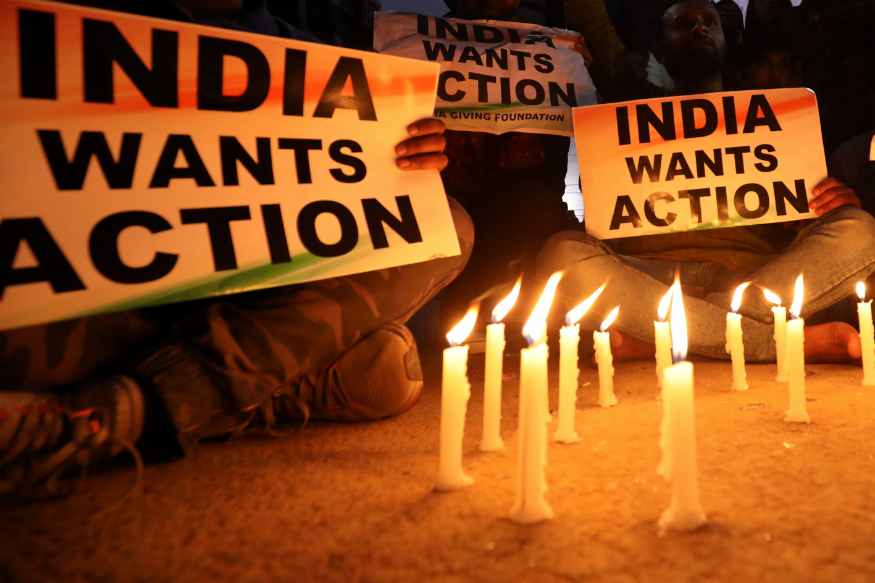Jingoism & Hate-Fest: Time To Save Patriotism From Patriots

In the age of candle-light patriotism and chest-thumping jingoism, the dialogue “Ghar mein ghus ke marenge” is par for the course. It’s macho. It’s soul-pleasing. And it’s an emphatic way of announcing the arrival of the new, muscular India to the world at large.
There’s a small problem though: It appears similar to the language of neighbourhood ruffians. A Hindi film hero mouthing it might get some claps from front benchers if he is convincing enough. But when top politicians do so, you know that the thick line between statesmanlike conduct and street bravado has been breached. They are not behaving with dignity befitting their stature.
We are not taking names here, lest we raise the hackles of the mobs who brook no aspersion on their leaders. The hint should be adequate. But these developments should make us ponder about the new brand of patriotism that has come to settle in the country. You can feel it in the air and the breath of the bristling people around you.
So how does a patriot look in the “new” India? Well, the question is more adequately addressed by the way he conducts himself. Here goes a brief list of his activities.
One, he is always busy asserting that he is a bigger patriot than the man standing next to him.
Two, he wears patriotism on his sleeve and would consider no moment inappropriate to flaunt it brazenly.
Three, he would not hesitate to thrash a physically challenged person or a pregnant woman for not standing up for the National Anthem at a theatre.
Four, he displays visceral hatred for Pakistan and there can be no limit to his crudeness while he is at it. Dancing naked, for example, in front of the Pakistani embassy is perfectly acceptable.
Five, he equates the country with the government, and, by extension, the government with the party that leads it, or with the leader of the party. Thus, the country and the leader become inseparable.
Six, he has to idolise and lionise the army. He would extol the valour of defence personnel and shed copious tears on their killing. But he would never question why so many of them have to come home as martyrs in the first place.
Seven, he will be part of candle-light marches after every tragedy involving defence personnel. And wave the Tricolour for the cameras. He would consider those not participating as traitors. And yet, he would refuse to entertain the thought of his son or brother being part of the armed forces.
Eight, he would display hate for Muslims compulsively. In his reductive understanding, every Muslim is a terrorist, at least a potential terrorist. It is not important whether he has any first-hand acquaintance with a member of that community or any understanding of it.
Nine, he would thrash Kashmiris studying or doing business in any part of India. He believes it is a patriotic act because the people of Kashmir are “the enemy of the nation”. Roughing them up and pushing them back to the Valley helps India’s cause.
Ten, on social media he would turn violent against anyone for even remotely hinting at something adverse about the government, the party, the great leader or Hindutva. Or, for talking against superstitions and about scientific temper.
We can go on and on. But the common thread in all this is clear: patriotism of the new kind has to be full of aggression and hateful instincts. It does not have to be sober, mature and reasoned. It has to be defined in terms of the will of the vocal majority and enforced upon the rest of the countrymen.
In short, it is patriotism of the mob. Constricted in its narrow, uninformed worldview, it tends to be divisive and dangerous. When leaders speak the language of the mob, they validate and approve all the negatives of the latter. And provide them the veneer of legitimacy. To understand it better, a study of Nazi Germany under Adolf Hitler would be instructive. People were killing millions of Jews and those considered anti-establishment, all fellow countrymen, and they were convinced that they were doing the right thing. Love for the country had transformed into hate for sections of people and dissenting ideas.
Can India, with its mind-boggling diversity, afford to normalise the patriotism built on hatred and exclusivism? No. There would be a heavy price to pay. Perhaps it is time to save patriotism from patriots.
Disclaimer: The views and opinions expressed in this article are those of the author and do not necessarily reflect the official policy or position of Odisha Bytes.

Comments are closed.